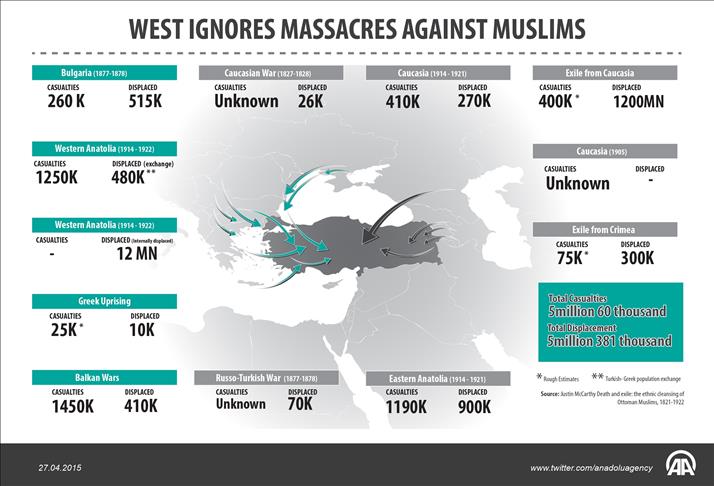West ignores massacres against Muslims
In 1995 book, "Death and Exile: The Ethnic Cleansing of Ottoman Muslims," Justin McCarthy, a historian and demographer at Louisville University, shed light on massacre and exile of Muslims in Balkans, Caucasus and Anatolia

ANKARA
The West, in calling the 1915 events "genocide," ignored the pain of millions of Muslims who were massacred or forced to leave their homelands during the last period of the Ottoman Empire.
The 1915 events took place during World War I when a portion of the Armenian population living in the Ottoman Empire sided with the invading Russians and revolted.
The relocation of Armenians by the Ottomans in eastern Anatolia following the revolts resulted in numerous casualties. Turkey does not dispute that there were casualties on both sides, but rejects calling the events "genocide."
Turkey has called for the establishment of a joint commission of historians and the opening of archives to study and uncover what happened between the Ottoman Empire and its Armenian citizens.
In his 1995 book, "Death and Exile: The Ethnic Cleansing of Ottoman Muslims," Justin McCarthy, a historian and demographer at Louisville University, shed light on the massacre and exile of Muslims in the Balkans, the Caucasus and Anatolia that took place from 1821-1922.
McCarthy wrote about the mass killings against the Muslim population inside the Ottoman Empire's borders after it entered a weakening process, adding that more than five million Muslims were killed, exiled or forced to migrate, where they died of hunger and disease.
In addition, the history of the massacres Muslims faced in the Balkans, the Caucasus and Anatolia is not included in any publication and their losses are not taught in history classes, either.
First massacre by Greece
The Turkish people in western Thrace became the target of armed Greek groups in the early 1800s as they were viewed as an obstacle to creating a Greece that "only belonged to Greeks." In 1821, Turks living in villages and towns were taken out of their homes and massacred. More than 25,000 Turks from western Thrace are believed to have been killed during this period.
Muslims forced to migrate
According to McCarthy's book, in the early 19th century, Noghai and Crimean Tatars were offered two options within the scope of the "Russianization policy" in the region. They could either be sent to the inner regions of Russia or to the Ottoman Empire.
The book says that the migration of Noghai Tatars lasted until 1860 and at least 300,000 Tatars had to migrate from their homelands. In addition, the balance of the Caucasus and the Ottoman Empire during the 19th century was turned upside down with the Russian invasions, Armenian revolts and Muslims from the Caucasus being forced to migrate.
Ahead of the Russian invasion, the Muslim people in Caucasia were composed of Turks, from the Azerbaijan-Yerevan region, and of Circassian, Abkhasian, Chechen-Ingushetian and Dagestanian nationals.
After the Russians seized control of Caucasia, they forced the Muslims there to migrate, the book states. The Muslim Circassians and other Caucasian people were put on ships and taken to the first destination inside the borders of the Ottoman Empire, the Trabzon Port, which today is in northern Turkey.
Those who died of disease and poor nutrition were reported to have been over 30,000.
Justin McCarthy discusses the massacres committed in the eastern states of the Ottoman Empire and Caucasia between 1877 and 1914, saying that the Russians occupied the Muslims' homelands and Armenians were trying to seize the areas left by the Russians.
The author said that during the war between Muslims and Armenians in eastern Anatolia, 62 percent of Muslims in Van province, 42 percent in Bitlis province and 31 percent in Erzurum province were massacred.
Changing population distribution in Balkans
McCarthy said the Russo-Turkish War (1877–78) turned into a havoc for Turks living in Bulgaria due to massacres by Bulgaria and Russia, disease, hunger and bad camping conditions.
The book discusses how Russians, who wanted to annihilate Turkish presence in Bulgaria, set fire to the homes of Turks and collaborated with the Bulgarians to prevent the return of Turks. In 1911, the population distribution completely changed and with the losses in the Balkan wars, Muslims lost being the majority in the Balkans.
Massacring Turks in Izmir
The book also touched on a massive massacre of Turkish people during the Greek occupation of western Anatolia on May 15, 1919.
Muslims composed 80 percent of the population during that time, but Turkish villages were burnt and destroyed. In addition, between the 1912 Independence War and 1922, more than 1.2 million Muslims were killed. When the war ended, the minority Muslim groups were forced to leave their homelands.
Anadolu Agency website contains only a portion of the news stories offered to subscribers in the AA News Broadcasting System (HAS), and in summarized form. Please contact us for subscription options.

